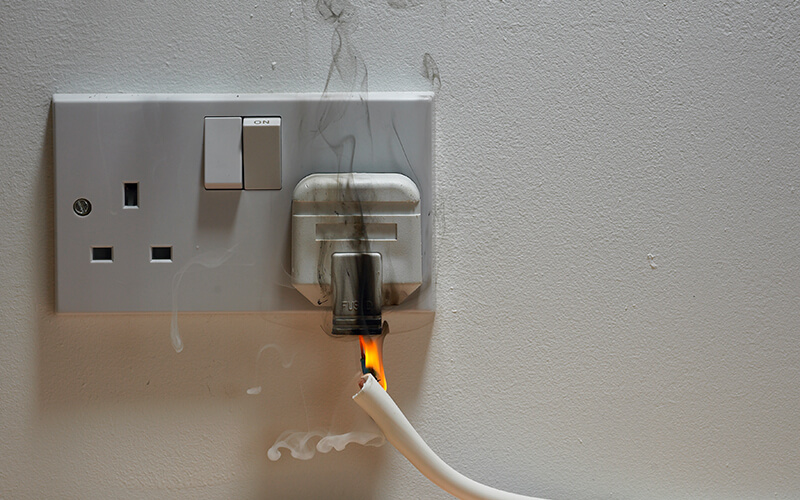Electricity and electrical appliances are so commonplace that we barely even think about them. That familiarity however can mean we don’t always appreciate the level of risk they could pose including the electrical fire risks. Electrical fires are one of the main types of fires in both workplaces and residential premises. That’s why the aim of November’s Electrical Fire Safety Week is to make us pay more attention to the risks and think about how to reduce them.
There are various reasons behind why an electrical fire could break out. There could be a malfunction of the electrical components contained within a piece of equipment or an overloaded circuit or extension cable which overheats. If wiring is broken or damaged, it could short circuit or cause sparks which can trigger a fire. Even if it’s functioning correctly, electrical equipment is a source of heat; if it’s located close to combustible materials, it could cause a fire.
How can you reduce electrical fire risks in the workplace?
Visual checks should be carried out regularly to look for any signs of damaged cables, plugs or sockets. And the risk of power socket overload should be reduced by limiting the number of appliances plugged in at any one time. Along with ensuring good ventilation and cleaning to avoid dust build-up, make sure combustible materials, (even seemingly innocuous ones like paper and cardboard), are stored safely and not kept too close to electrical appliances that could get warm.
While visual checks are important and can help identify a lot of problems before they go on to cause fires, not every fault can be detected that way. So it’s important to have electrical inspections, and PAT tests to ensure that appliances are still safe to use. There isn’t a specific law governing PAT testing, but The Electricity at Work Regulations 1989 require any electrical equipment that could cause injury to be maintained in a safe condition. A qualified person will be able to both carry out the tests as well as advise on the frequency of testing depending on the type of equipment and environment it’s located in.
Electrical fires in other settings
Electrical fire risk is as much of a threat outside the workplace too: in homes and also in other residential properties such as student accommodation and privately rented homes.
The risk is addressed through ever-tightening legislation to a large extent; for example, in April this year the 2020 Electrical Safety Regulations were extended to cover all tenancies (new and existing) in England to ensure that electrical installations remain safe. But while building owners must comply with all relevant legislation and do everything possible to keep their tenants safe from fire, it’s also important that they help the tenants themselves understand the role they must play. Faulty electrical appliances were calculated to have caused an average of 43 fires a week in England alone in figures released earlier on this year. It’s vital that everyone is aware of the dangers and the need for them to take simple steps to reduce those risks. Along with the points already mentioned - such as avoiding overloading sockets and keeping an eye out for visible signs of problems - other actions include:
- Plugging high-powered appliances (like washing machines or tumble dryers) into single sockets.
- Never leaving white goods like washing machines or dishwashers running, or items such as mobile phones charging, overnight.
- Never using a hot water bottle at the same time as an electric blanket, and always unplugging electric blankets before going to sleep.
In all settings it is of course also essential to have appropriate fire detection and firefighting equipment in place - including the correct type of fire extinguisher for dealing with electrical fires – along with a robust plan for safe evacuation.
The risk from cheap, unbranded electrical items
Another significant and increasing problem is the volume of unsafe electrical goods being sold via online platforms. In fact, this is something that is of real concern to Electrical Safety First, the organisation behind Electrical Fire Safety Week. It is currently promoting a campaign asking people to contact their MPs and request their involvement in stopping the sale of dangerous electrical goods via online marketplaces. You will find the petition here if you would like to support it.
Electrical Fire Safety Week is running from the 22nd to the 28th of November. You can follow the campaign on social media via the hashtag #EFSW. And if you would like support with any aspect of your fire prevention and detection requirements, including PAT testing, then please don’t hesitate to get in contact with us.
